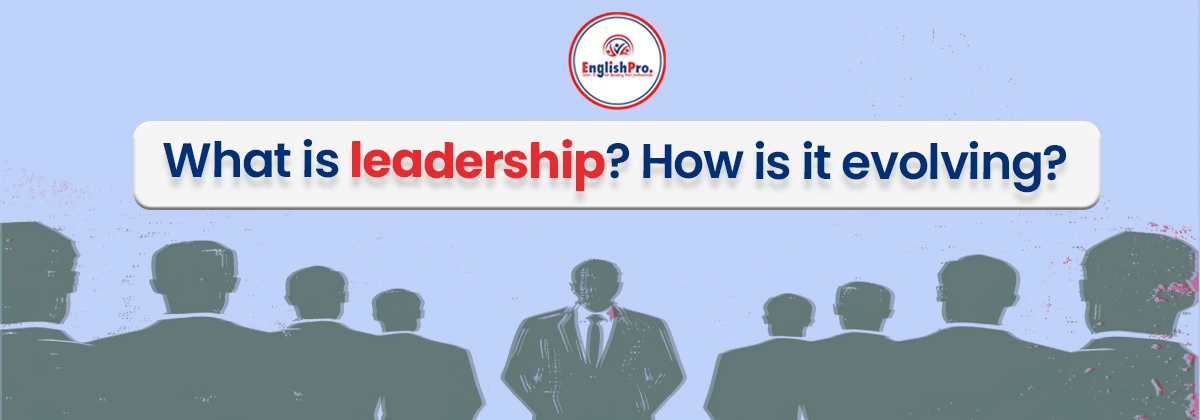
Table of Contents
ToggleThe most common question, however, that runs through the minds of many people is: What is leadership? How is it evolving? The world of work is changing rapidly, and so is leadership. The issue of leadership has gone beyond corporate boardrooms or classrooms into giving orders, but leadership has become guiding, inspiring, and being able to adapt to changes.
In this article, we will define leadership, examine its evolving nature, and explore how modern leaders can thrive in today’s complex environment.
Definition of Leadership:
In basic terms, leadership is a skill that is capable of influencing people, motivating, and directing people or groups of people to be able to achieve shared objectives. Leadership is not like management as far as it is concerned with the processes and structure; it is more about vision, motivation, and impact.
The definition of leadership is not just about authority, but it is also about responsibility. Real leaders also create the feeling of trust, foster cooperation, and enable others to achieve their full potential.
Key aspects of leadership include:
- Vision: Providing clear direction for the future.
- Inspiration: Motivating others through actions and words.
- Integrity: Leading by example with honesty and fairness.
- Adaptability: Responding effectively to challenges and changes.
- Empowerment: Encouraging individuals to grow and contribute meaningfully.
So, when people ask what leadership is, the answer simply is, it is not only about holding the title, but it is all about creating influence and guiding others toward meaningful progress.
Why Leadership Matters
Why is there a need for leadership in this world? Whether it’s business, schools, communities, or governments, leadership provides the direction and guidance necessary for growth and stability.
It is very crucial because it directs the growth of organizations, communities, and even nations. Without it, goals stay unfulfilled and visions never become reality.
Leaders matter because they:
- Provide clarity during uncertainty.
- Build trust among teams and stakeholders.
- Encourage innovation by supporting new ideas.
- Resolve conflicts fairly and constructively.
- Drive results by aligning actions with organizational goals.
Therefore, in short, leadership is the backbone of progress and is often strengthened by important things to work on in personality development.
Leadership in the Past vs. Leadership Today
In order to answer the question of what leadership is and how it takes shape, it would be beneficial to compare the ages and different styles of contemporary and traditional leadership.
| Traditional Leadership Characteristics | Modern Leadership Characteristics |
| Focused on authority and hierarchy. | Focuses on collaboration and inclusivity. |
| Leadership meant command and control. | Leaders act as mentors and coaches, not just authority figures. |
| Decisions were often top-down with little team input. | Decision-making often involves team participation. |
| Success was measured primarily by efficiency and results. | Success is measured not only by results but also by employee well-being, innovation, and adaptability. |
This evolution shows that leadership is shifting from control to connection, much like how strong personality traits of highly successful people have reshaped workplace expectations.
The Evolving Dimensions of Leadership
What is Leadership? How is it evolving? Leadership is evolving to meet the needs of today’s workforce and society. Some emerging aspects include:
1. Emotional Intelligence
Leaders today must understand and manage their own emotions while empathizing with others. Emotional intelligence builds stronger teams and reduces workplace conflict.
2. Adaptability to Technology
As AI, automation, and digital tools reshape industries, leadership now requires tech-savviness and the ability to prepare teams for change.
3. Diversity and Inclusion
Modern leaders must ensure diverse voices are heard and respected. Inclusion drives creativity, innovation, and fairness.
4. Sustainability and Ethics
Leadership is no longer only about profit. Social responsibility, ethical practices, and environmental awareness are now key measures of success.
5. Collaboration Across Boundaries
With remote work and global teams, leaders must build trust and unity across geographical and cultural boundaries, often enhanced by improving communication skills in English
Qualities of a Successful Leader
Strong leadership depends on certain timeless qualities, such as:
- Thinking like a visionary: Looking for new opportunities and creating a clear direction.
- Effective communication: Sharing ideas clearly and listening to others.
- Decisiveness: Making bold choices while considering others’ suggestions.
- Resilience: Staying strong during difficult times.
- Empathy: Understanding the needs and feelings of team members.
These are attributes that demonstrate that leadership is an art and a science, which is a combination of interpersonal skills and strategic thinking. Leaders who master English idioms for effective communication often strengthen their ability to inspire diverse teams.
Learn the meaning of leadership and boost your educational journey today
How to Develop Leadership Skills
Leadership does not belong to the CEOs or managers; it can and is better learnt by people. When looking to develop as a leader, you could think in terms of the following:
- Get Feedback: You should request feedback about your leadership style regularly.
- Invest in learning: Attend leadership training programs, workshops, or be mentored.
- Practice Decision-Making: Give yourself confidence by learning to make small, quick decisions.
- Strengthen Communication: Practice active listening and public speaking.
- Emotional Intelligence: Learn to be empathetic and self-aware.
- Foster Teamwork: Establish collaborative and shared responsibility with others.
Whenever you ask yourself: What is leadership? How is it evolving? Remember that it is an evolving process that repeats itself after persevering through self-reflection. If setbacks occur, leaders must also know how to bounce back stronger.
Leadership is the foundation of education and career success in every field
Leadership in the Future: What to Expect
It is not new that leadership is evolving in the workplace and society. The future of leadership will appear even more altered in the days ahead as these workplaces, as well as societies, are still changing. The most important are:
- More Human-Centered Leadership: Paying attention to well-being and work-life balance.
- Tech-Integrated Leadership: Data-Driven Insights and AI to Make Better Decisions.
- Global Collaboration: Directing cross-border diverse groups.
- Agility: A swift ability to adapt to economic, social, or environmental change.
- Ethical Responsibility: Being a leader who is fair, sustainable, and accountable.
Given that workplaces and societies are changing, the definition of leadership would change, too. Due to such constant changes, the leaders of the future have to be more adaptable, more understanding, and more oriented toward the future than ever before. Learning from basic facts about English-speaking courses can also enhance cross-cultural leadership communication.

Conclusion
So, what is leadership? How is it evolving? The answer is that it is an ability to inspire, guide, and influence other people toward achieving their goals. Leadership is not just about a title or a position, or the authority that a person holds. It is about vision, empathy, and it is about the ability to influence other people to move forward.
Key Points:
- Leadership can create stronger teams, healthier organizations, and a better future for everyone if it is practiced with integrity and innovation.
- Last but not least, you have to remember that it is not just the position, but it is the practice.
- The more intention you put into becoming a better leader, the greater the impact you will make.
So, start by identifying the leadership skill that you want to improve and take action today. Your journey as a leader begins now.
Do you want to become the kind of leader who inspires change and drives success?
Start your leadership journey today with our Personality Development and Leadership Training. Enroll Now.

J. Julia Kamei
J. Julia Kamei is a professional content writer with 4+ years’ experience creating impactful content for clients in the USA, India, Canada, the UK, and Europe. An M.A. History graduate, she specializes in immigration, business, IT, digital marketing, AI, and Data Science. She also mentors students for international education and research.




